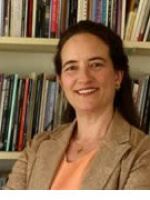Kansas City’s BkMk Press has a new collection of poetry by Native American writers about the Middle East.
The book's title — The World Is One Place: Native American Poets Visit the Middle East — was inspired by advice given to BkMk managing editor Ben Furnish by a teacher years ago.
“She said, ‘Something I don’t want you to forget — even if you forget all the lessons I’m teaching you, don’t forget: We all live in the same world. And don’t start thinking that you live in a different world from other people – you’ll get in trouble.’”
Furnish recounted that advice in a conversation with Angela Elam of "New Letters On The Air" and the book's co-editors, Diane Glancy and Linda Rodriguez.
Here are excerpts of that conversation, starting with what Glancy discovered on a trip to Syria and Jordan in the mid-1990s.
GLANCY: There were similarities to native history’ – I’m reading from the forward – ‘the takeover of one by another, the loss of a place and a way of life.’ And even back in 1994 as I talked to students, visiting universities, I felt that longing for freedom. I felt that longing for ownership of homeland. There was just a lot that we had in common.
ELAM: Ben, you have a great introduction, where the spark for this anthology started. Do you want to tell us that story?

FURNISH: There is a lot of interest in the Middle East in Native American writers. And there were a large number of Native poets who had visited the Middle East, not simply as tourists but seriously visited as artists, where they spent significant time with people sharing their work. So we were ticking off the names of people and the list kept getting longer, and I kept thinking, as an inveterate editor, there must be a book here.
That interaction between Native writers and the Middle East, it’s significant, it needs to be honored, it needs to be recognized and it needs to be celebrated, not only for its intrinsic value but because of what it could offer perhaps as a bridge for both the wider American culture and the world of the Middle East.
ELAM: You know, the thought that something could be accomplished words, I love this, that people with literary backgrounds were invited over. Can you talk about that?
GLANCY: Yes, I visited mainly universities and writers groups, and you walk in and the students are looking at you. Here you are this stranger. I got asked such interesting questions — 'What about the violence in America? Everybody is rich there.' So I read my ordinary poems, ordinary language out of what my life was like. And there would be a melting, there would be sort of a camaraderie. There was a nice response to it.
I remember very fondly many of the students would come up to the desk afterwards and we would speak, many of them did speak English. And the attaché was there with me and they would ask wasn’t I afraid to speak honestly of America with him sitting there, wouldn’t I be in trouble? Because they were so used to being dominated by the government and no freedom to speak and how could I do that with him, because he could tell the government what I was saying. I was free to criticize, mildly, America and the treatment of the Native American. And I did have that freedom, which they did not. But you saw that longing even then.

When the uprising (happened) in 2011, I wasn’t surprised at all because I had seen the seeds of it then, they were wanting that. They just did not know what it would cost them.
ELAM: “Necessary Departures” is at the end of the first section, “Place.” Diane, why don’t you read that for us?
GLANCY: This poem was written while the O.J. Simpson trial was going on and back in the hotel I would see little glimpses of the white car down the highway. So that's what "the verdict"—
ELAM: Oh, that’s what it’s referring to.
GLANCY: Yes. “Necessary Departures":
You clunk your boot in the updust of religion.
There is no lightness here.
The forces rally in their own divided land.
It’s hard to straddle the old argument:
Cain with the crops of his field,
Abel with the lamb
as he must have been instructed.
What floats inland as the only boat,
militant, avenging.
You see them in the shadows,
you hear them on the screen
grounding a different ground
than yours to stand on,
your indivisibility divided into units.
Not the justice you knew
when you heard the verdict
as we move toward the holy wars
at the headwaters of the world."
Listen to the entire New Letters on the Air interview with Ben Furnish, Diane Glancy and Linda Rodriguez here, including Rodriguez reading from her essay "Are Our Hands Clean?"
New Letters on the Air, public radio's longest-running literary program, is produced by New Letters magazine at the University of Missouri-Kansas City.
Angela Elam is the producer and host of New Letters on the Air, and Jamie Walsh is the assistant producer. You can follow the show on Twitter at @NewLettersRadio.
C.J. Janovy is an arts reporter for KCUR 89.3. You can find her on Twitter, @cjjanovy.






